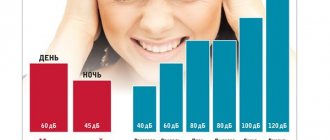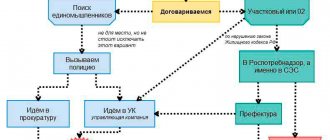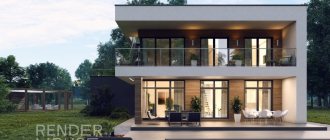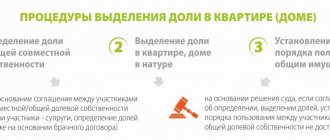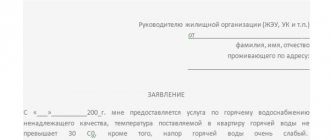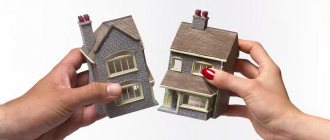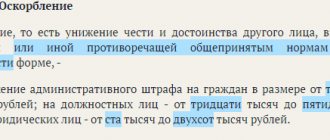On the territory of the Russian Federation, there are special laws that protect the psychological well-being and physical health of citizens from loud noise. In accordance with these laws, the noise level in the workplace, in the apartment and in the local area must be limited in accordance with certain requirements, and if these rules are ignored, penalties may be applied to the violator. But what noise restrictions apply in apartments and adjacent areas? Is the noise level in the workplace regulated? Is it true that Moscow has stricter noise laws? These issues will be discussed below.
Noise level in decibels
Many objects and human activities can produce noise of varying volumes. Quiet sound is safe for the human body, but prolonged exposure to loud noise can negatively affect a person’s well-being and even health. Therefore, the legislation of the Russian Federation is designed in such a way that a person is not exposed to loud noise. Noise standards depend on the type of site for which noise standards are established, the time of day, and so on. If these rules are ignored, administrative sanctions may be applied to the violator, and the amount of the fine depends on the legal status of the violator.
But let's first find out how loud certain sounds are. For convenience, we have collected this information in a special table (units of measurement are decibels):
| Noise Source | Noise level |
| Calm measured breathing | up to 10 dB |
| Clock ticking | up to 20 dB |
| Whisper | up to 30 dB |
| Working air conditioner or computer | up to 40 dB |
| Calm conversation, TV | up to 50 dB |
| Passenger car | up to 60 dB |
| Working electric razor | up to 70 dB |
| Included vacuum cleaner or hair dryer | up to 80 dB |
| Loud screams or crying of children | up to 90 dB |
| Repair work using various equipment | up to 100 dB |
| Working jackhammer | up to 110 dB |
| Screech | up to 120 dB |
| Loud music | up to 130 dB |
| Shot from a firearm | up to 140 dB |
Reasons for examination
Noise pollution negatively affects the health of citizens. If health problems may arise as a result of violations of noise level standards, an examination should be carried out. It is the conclusion from the expert organization that is the basis for filing a case with the judicial authorities.
In some cases, research is not carried out at the request of citizens:
- Organization of mass events.
- Natural disasters, alarm going off.
- Elimination of consequences of natural phenomena.
- Movement of public urban transport, aircraft.
Noisy neighbors should be dealt with with the help of law enforcement agencies.
Permissible noise level in the apartment
Noise standards have been established for residential apartments in a multi-storey building. The main regulatory document is Federal Law No. 52, which is often called the law on silence. This law was passed in 1999; This law has been amended periodically, but most of these amendments are minor. The main feature of this law in 2018-2019 is that each subject of the Russian Federation can make small changes and amendments, so the sound mode is slightly different depending on what region you live in.
However, on the territory of most constituent entities of the Russian Federation the following restrictions regarding noise levels apply:
- During the daytime (from 7 a.m. to 11 p.m.), the average noise level should be no more than 40 dB. In this case, it is periodically allowed to make sounds with a power of up to 55 dB, but such sounds must be short-lived. For example, in the case of repairs, it is allowed to periodically turn on a loud drill, which will not be a violation of the law; However, such a drill should not be left turned on, since this will cause the tool to make loud noises constantly, which will be a violation of the law.
- At night (from 11 p.m. to 7 a.m.), the average noise level should be no more than 30 dB. At the same time, it is also periodically allowed to make loud sounds with a power of up to 45 dB, and the nature of the sound should be short-term.
- Of primary importance is only the volume of a particular sound (and also, in some cases, its duration), but the origin of the sound itself does not matter. For example, you can easily turn on the music center at any time of the day, and your neighbors have no right to prevent you from doing this; however, the volume of the music center should be no more than 40 dB during the day or 30 dB at night - and if this rule is violated, the neighbors may actually report you to the police.
- In Moscow and some other cities, additional rules apply. Firstly, Moscow legislation introduces the term “time of silence”. Quiet times are defined as 2 daily intervals - from 7 pm to 9 am and from 1 pm to 3 pm. During this time, the following activities are prohibited: repair work, fireworks, loud singing, whistling, and so on. Secondly, additional restrictions apply during the holidays in Moscow. On public holidays, daytime hours last from 10 am to 10 pm (rather than from 7 am to 11 pm), and during this time it is allowed to make sounds up to 40 dB with the possibility of a short-term increase in sound up to 55 dB.
For violation of the above rules, administrative liability is provided under Article 3.13. If the violation was committed during the daytime, then in this case it is necessary to call a Rospotrebnadzor employee to your home to conduct a special examination. To carry out the examination, a special device is used that measures the noise level in the apartment - if it shows that your neighbor is making loud noise, then a special report will be drawn up. With this act you need to contact the police and write a statement. After this, the violation case will be transferred to the administrative court for consideration.
The penalty for making loud noise is:
| Legal status of the offender | Amount of fine |
| Private person | from 1 to 4 thousand rubles or a warning (if the violation was committed for the first time) |
| Executive | from 4 to 8 thousand rubles |
| Legal entity or individual entrepreneur | from 40 to 80 thousand rubles |
Why is loud noise dangerous?
A person feels most comfortable when the background noise is within the range of 40-45 dB; for a sleeping person, the threshold is 10-15 dB lower than during the day. If background noise often exceeds 100 dB, even in short bursts, this can cause serious harm to the body.
If a person often stays in noisy rooms, his sensory cells begin to be damaged, and this can result in deafness. The permissible noise level, according to WHO, is no more than 85 dB, provided that a person stays in it for no more than 8 hours at a time. It is better not to listen to noise louder than 100 dB for more than 15 minutes. Typically, such sounds are present at concerts, nightclubs, stadiums - wherever there are powerful speaker systems.
A person may not even understand at first that increased noise levels are harmful to him: adaptation occurs and the hearing threshold increases. Surely, everyone is familiar with the feeling that if you go into a quiet room after a loud noise, it is very difficult to recognize quiet sounds. The sharpness of the sound is quickly restored, but each time it becomes slower and more difficult. Consequently, if you are in a noisy environment, you can completely lose the ability to distinguish sounds at a certain frequency, which are called quiet. In this case, sensorineural hearing loss develops, and if such exposure occurs systematically, complete deafness occurs.
If there is constantly increased background noise in the apartment, then the person will sleep restlessly and have problems sleeping. The consequence of this is a decrease in performance and cognitive activity, this is especially noticeable in children.
The cardiovascular system is also very vulnerable to increased background noise; it is a favorable environment for the development (or worsening) of hypertension, stroke, heart attack and heart failure. In addition, the endocrine system also suffers, for example, diseases such as:
- diabetes;
- sexual disorders;
- thyroid diseases.
The nervous system is also susceptible to increased background noise. A person living in noise notices a decrease in concentration, memory loss, mood swings, depression and even panic attacks. The list of negative impacts does not end there.
Noise standards in an apartment building - latest changes in the law 2018-2019
For the local area next to an apartment building, slightly different noise restrictions have been established. In the daytime (from 7 to 23 hours) the noise level should be no more than 70 dB, and in the evening - no more than 60 dB. However, please note that after 19.00 some other activities that make a lot of noise are also prohibited:
- Carrying out repair work.
- Launching fireworks.
- Loud music.
- Parties.
- Loud singing.
- Whistling.
Violation of these rules is subject to standard administrative liability under Article 3.13. Punishment for individuals - from 1 to 4 thousand rubles or a warning, for officials - from 4 to 8 thousand rubles, for legal entities and individual entrepreneurs - from 40 to 80 thousand rubles. The main regulatory act is Federal Law No. 52 (the so-called law on silence), as well as various regional laws. The latest amendments, which limit the use of certain sounds after 7 p.m., were made to the law on silence in 2012, and the law has not changed since then.
What could be the sources?
In an MKD apartment, many sounds can irritate with their volume, preventing you from resting, falling asleep calmly and quickly, reading a book and just living normally. Sources of increased background noise can be :
- TV, tape recorder and other playback devices turned on at high volume;
- playing musical instruments, especially piano, piano, trumpet;
- sounds of scandal, screams;
- loud feasts with songs and dances;
- operation of elevators, pumps;
- noise made by the fan. equipment;
- sounds of working power tools, etc.
There can be many sources of cacophony; the apartment can hear everything that happens behind the wall, under or above the home, as well as in the yard - the roar of a motorcycle, car, tram, train, construction site, loading and unloading work at a built-in store, etc.
But it is important to understand that playing musical instruments is the right of residents , just like sorting things out or celebrating a birthday.
Another thing is that the loudness of what is happening annoys the neighbors, however, such actions can be regarded as nothing more than petty hooliganism, and have nothing to do with the noise that is subject to measurement.
At work
Sanitary noise standards also apply to the workplace. Moreover, the governing law in this case is the sanitary law SN 2.2.4. This law states that the maximum permissible noise level in the workplace depends on two parameters - the severity of the work and the degree of stress of the worker. These two parameters must be determined by a special commission or any person who has the appropriate education. Noise standards according to legislation in 2018-2019 in the workplace are as follows:
| Type of work | Maximum noise level |
| Light to medium work with low stress levels | 80 dB |
| Heavy, low-stress work | 75 dB |
| Light to medium-stress work | 70 dB |
| Heavy work with medium voltage levels | 65 dB |
| Various high voltage jobs | 60 dB |
| Various jobs with very high voltage levels | 50 dB |
Violation of noise standards is equivalent to a violation of sanitary standards. The fact of a violation is established on the basis of a control noise measurement using a special device that determines the noise level in the room. Control measurements are carried out by Rospotrebnadzor authorities during a scheduled or unscheduled inspection of an enterprise. If violations are detected, a person may be held administratively liable under Article 6.4. The punishment in 2018-2019 is:
| Legal status of the offender | Amount of fine |
| Individual | from 500 to 1,000 rubles |
| Executive | from 1,000 to 2,000 rubles |
| Individual entrepreneur | from 1,000 to 2,000 rubles or suspension of activities (up to 90 days) |
| Entity | from 10,000 to 20,000 rubles or suspension of activities (up to 90 days) |
Who measures and where to go
In order for noise measurements to have legal force and be used in court, they must be carried out by authorized persons. These may be judicial officials (if noise measurements are ordered during the trial), employees of Rospotrebnadzor or organizations with similar licenses.
In order to call an employee who will measure the noise level, you need to submit an application. Then the expert who made the measurements may be invited to the court to provide explanations.
Legislation
Life in multi-storey residential buildings in complete silence is very difficult to imagine, because different events occur in each family (repairs, rearrangement of furniture, holidays).
The number of apartments can sometimes number several hundred. It is clear that it is quite difficult to avoid children’s crying, and repair work is also simply necessary. The situation is aggravated by the fact that there are citizens who do not try to reduce the noise that comes from their apartment.
Noise volume is a subjective concept. In order to evaluate the sound background objectively, in the Russian Federation they use the following legal framework:
- Federal Law No. 52 of March 30, 1999 (as amended on July 3, 2021);
- SN No. 2.2.4 / 2.1.8.562-96;
- SanPiN 2.1.2.1002-00.
Subjects of the Russian Federation may have their own established standards for sound intensity, because noise, in addition to unpleasant sensations, can provoke deterioration of health.
ATTENTION! The noise level is measured with a special device, the result obtained during the measurements is converted into decibels. All laws use this particular unit of measurement.
Ways to protect yourself from noise pollution
photo from Noyabrsk-inform website
- In urban development, means of isolation from highways and railways are provided: non-residential buildings, garages, and plantings are erected.
- At home, you should be careful when choosing household appliances. Having your refrigerator, washing machine, and air conditioner on can give you migraines and irritability. With a careful examination of equipment indicators, you can reduce 50 dB in an apartment by 25, for example, by replacing a monoblock air conditioner with a split system.
- Pay attention to the most vulnerable places in the apartment - window and door openings, cracks. A regular PVC double glazed window reduces the sound coming from the street by 25 - 28 dB on average. If there is a source of particular volume near the apartment (motorway, airport), you can install windows with increased sound insulation.
- During repairs, pay attention to the gaps between the wall and ceiling. They should be filled with foam or other material so that sounds from the neighboring apartment do not complicate your life. Wallpaper can also improve the situation - heavy vinyl ones will create another barrier. The same applies to the floor: an additional layer between the concrete and the final coating will allow you to forget about your neighbors below.
Finally, a piece of advice to maintain your peace of mind and health: after a hard and noisy day at work, after a fun but loud holiday, take time for silence. Sounds up to 35 dB are optimal. Time in nature or soft classical music will calm your nerves and prepare you for another day in the city.
Information about the competence of experts
The absence in the noise measurement protocol of information about the competence of the specialists conducting the measurements is an additional basis for doubting the reliability of the evidence. The courts also pay attention to this.
For example, coming to the conclusion that the protocol for measuring noise levels is not reliable evidence, the court referred to the fact that measurements of noise from construction sites were carried out without taking into account the general background, and also indicated that “the measurement protocol does not contain information about the expert who signed him, his competence, work experience, information about whether he has passed the appropriate certification” (see Appeal ruling of the Moscow City Court dated September 10, 2013 in case No. 11-12342).
